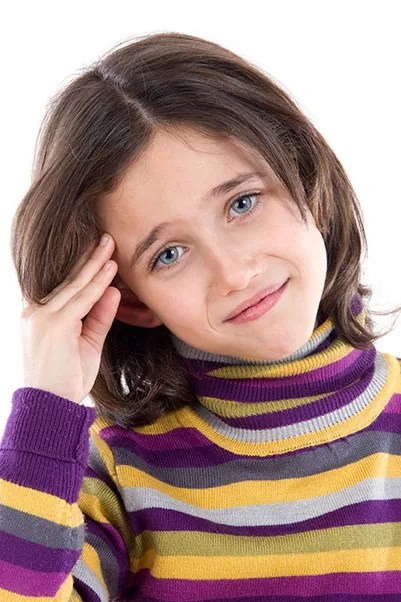Wendy Anderson-Willis, M.D., a pediatrician at Nationwide Children’s Hospital in Columbus, OH, shares what causes headaches in children and the treatments for a child’s headache.
 My child has been complaining of headaches recently. What causes them in children?
My child has been complaining of headaches recently. What causes them in children?
The two types of headaches that we see most commonly in children are tension headaches and migraines. It’s important to watch out for the triggers. Sickness is one of the most obvious times when a child will have a headache. Other major causes include stress, crying, skipping meals, dehydration, sleep problems, vision changes, not wearing glasses or overuse of contact lenses, menstrual cycles in girls, and congestion from allergies.
There are other triggers that can be environmentally based. Children who consume artificial sweeteners, MSG, and caffeine—also caffeine withdrawal—can be at risk for headaches. Sometimes even certain kinds of cheeses will give children headaches. You may also notice that loud music and long car trips can trigger a headache. Often children will get what we call a rebound headache from the overuse of headache medication.
What can I do to safely treat my child’s headache?
I recommend giving your child something to eat and drink and then have him take some time to lie down in a dark and quiet room. Sleep is very important in headache relief and this will often help the symptoms go away.
Sometimes headaches do not respond to sleep so an over-the-counter pain reliever like acetaminophen or ibuprofen can be helpful. If you give your child an over-the-counter medication, make sure it is not aspirin. Never give aspirin to anyone younger than 18. It can cause Reye syndrome, which is a serious illness.
The biggest thing I recommend parents do is to track how often their child complains of a headache. If it is mild and less than once a month, then go ahead and treat it at home. If headaches are happening more than once a month or if they are severe, it is time to see a doctor. Your doctor should ask about how often this happens and what you think may be triggering it. I always ask the child what their typical day looks like, so I can get a sense of what is going on that may lead to headaches. I look for whether they regularly skip meals, or if they are taking in too much caffeine. I want to know if they are sleeping at night and if they are drinking fluids throughout the day. If you as a parent can keep a “headache diary,” it will be helpful to the doctor. Write down everything from when things start, to what they had to eat or drink that day, to how bad the pain is and how you treated it.
If your child has any of the following symptoms it is important to see a doctor right away to rule out anything more serious: fever, neck pain or stiffness, vomiting, seizures, dizziness, vision changes, head injury, loss of consciousness, a headache that is present when waking up, or if the headache fails to resolve with sleep.
Most headaches aren’t signs that something more is wrong, but occasionally headaches are caused by more serious medical conditions. Bottom line for parents: If your son or daughter has frequent headaches, you can do more than simply surrender to the condition or manage the symptoms. One of the best ways to treat headaches in children is to stop them before they start. Work to see if you and your child’s doctor can identify the causes and find a solution.
Wendy Anderson-Willis, M.D., is a member of the pediatrics team at Nationwide Children’s Hospital in Columbus, OH.



















